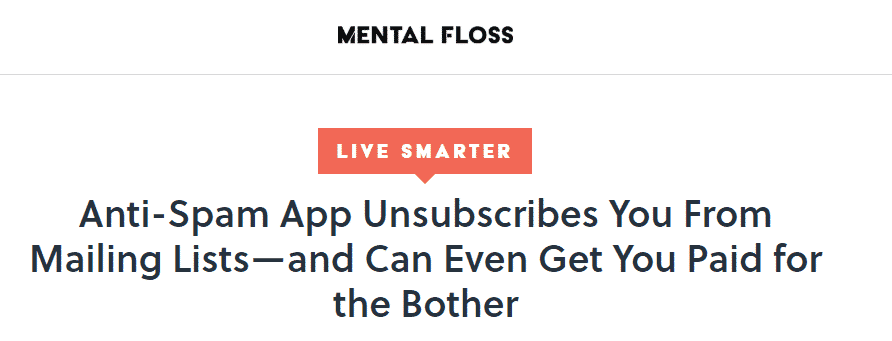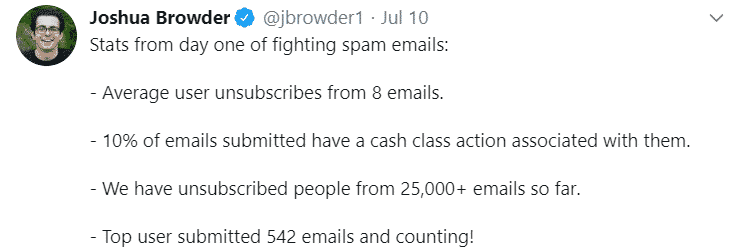Everything You Need to Know About Reporting Email Abuse
Spam email can come in many forms, and some of the content that crams up your inbox can be downright abusive. Even after you unsubscribe from emails coming from specific senders, they can still pop up in your inbox. If you had the misfortune to be the victim of email abuse, here is everything you need to know about reporting it.
Report Email Abuse Easily With the Help of DoNotPay

To get straight to the point, reporting email abuse through DoNotPay is the easiest thing in the world. You don’t have to contact any company’s customer service and trouble yourself with all the back and forth in the communication with them. You also won’t have to wait days and weeks on end for a response.
The only thing you need in order to report spam or email abuse is a DoNotPay account, which you can create using any . Once you are logged in, follow these short steps:
- Scroll down to the Spam Collector section
- Provide your email address
- Forward the abusive email you received to spam@donotpay.com
For real, that is all there is to reporting abusive emails with the help of DoNotPay. We will automatically unsubscribe you from the sender, thereby making it impossible for them to target you for any future spam or abusive mail.
The best part is that if the email was illegal—which, in case of abusive content, it most certainly was—there is a chance you will get compensated. Watch closely for the notifications on your DoNotPay dashboard to see a flag appear in the Spam Collector tab. If there is a class action suit against the sender, you can join it, and if the spammer loses the case or agrees to a settlement, you get money. Not bad at all!
DoNotPay values your time and privacy, and we do everything in our power to stop spam emails once and for all.
Reporting Abusive Emails on Your Own

There is more than one way to report abusive emails manually. Here are some of the most common ones:
- Directly through the Email Service Provider (ESP)
- On public reporting hubs
- To a relevant authority
The three methods are only some of the most common ways you can deal with unsolicited mail. Because there is a slim chance you’ll be rid of spammers for good, these methods don’t provide much satisfaction.
Your best bet is to report an abusive email through DoNotPay since you only need to forward the message to us — and you may even get money for doing it.
It also might not be a bad idea to learn how to block spam email on Android, if you have this operating system.
Email Abuse Reporting Through the ESP
One of the most direct methods of reporting email abuse is through the Email Service Provider (ESP) you are using. Whether it is Yahoo, Gmail, Outlook, or any other ESP, you can report the email by:
- Opening the spam or abusive email
- Find the More option (on Gmail, for example, these are the three upright dots in the upper right corner)
- Click on the Report (depending on your ESP, this can be Report Spam, Report Abuse, or Report Phishing)
Your ESP will then automatically remove the email from your inbox and investigate the case further. They may even contact you for additional information.
If you are using Gmail, you can also complete a form for reporting emails that are in violation of the company’s Terms of Use.
Report Abusive Emails to Public Reporting Hubs
There are many public services to which you can report a spam email or an abusive email. Perhaps the most popular one out there is SpamCop.
When you report a spam email to SpamCop, they can help by:
- Locating the source of the abusive email
- Contacting individual Internet Service Providers (ISPs) to penalize the spammer
- Including the sender of abusive content into their SpamCop Blocking List, minimizing future email abuse
SpamCop might be a neat service for fighting spam in general, but we don’t know how effective reporting spam to SpamCop is in terms of getting rid of spammers yourself.
Report Abusive Email to an Authority
Of course, you can always take action and report email abuse to an authoritative body. The U.S. Department of Justice is a good place to start learning about various forms of email abuse, as well as to which parties to report the senders. There are two most common ways people report abusive emails to the authorities:
- Completing forms
- Forwarding the abusive email to specific addresses
What Is Email Abuse?

Perhaps the best way to protect yourself from falling victim to email abuse is by educating yourself on the issue as much as you can. According to the latest statistics on email traffic, .
There are two main types of abusive emails:
- Spam
- Phishing emails
The first category is a less dangerous one since it primarily serves a purpose to sell a product or service—yet, spam email can also be utterly devastating to your productivity. If you suffered a flood of this type of unsolicited mail, you could take spam email revenge with the help of DoNotPay.
Phishing is a more severe form of email abuse, directly aimed to steal your identity, personal data, or other information. The abusers can do this by gaining unauthorized access to your bank account or computer system.
Methods the Senders of Abusive Emails Use
Some methods the offenders use to lure people into their trap are well-known, and every email user should be able to recognize them.
|
Points to Pay Attention to |
Giveaways |
|
Email Address | The domain of a spam email address is usually different from the company the spammer is supposedly representing. |
|
Links and Attachments | Slide your cursor over the link without opening it to see how legitimate the URL looks. |
|
Language Errors | Most scammers are not English native speakers. Their grammar and spelling will be poor. |
|
Urgency of the Message | If an email is imploring you to give out your information immediately due to some sudden issue, it is most certainly spam. |
You also need to learn more about how to stop receiving emails in general since some spam will keep coming back even after you unsubscribe.
DoNotPay Solves Your Physical Spam Mail Issues Too
Unfortunately, a huge chunk of spam mail is sent to people’s physical addresses too. Most of these are advertisements, which doesn’t make them any less annoying.
We have to warn you, though, that phishing through snail mail is also a thing. Here is a nasty example where abusers tried to insert malware into a potential victim’s computer system by sending a CD at the recipient’s physical address.
The excellent news is that DoNotPay helps you solve the issue of physical spam mail as well as the electronic one. Your only job is to:
- Go to the DoNotPay website
- Navigate to the DoNotMail section
- Provide your information
- Upload a picture of junk mail you received
Don’t Stop There With DoNotPay
Besides combating email abuse, DoNotPay fights a number of other issues people experience when dealing with various companies. Access DoNotPay from your to learn how far these services span.
Here is a neat list of all the ways in which we can help you:
- Sending people or companies to small claims court
- Fighting robocalls
- Appealing traffic tickets
- Terminating subscriptions and memberships
- Contesting speeding tickets
- Getting in touch with customer services without waiting in phone queues
- Working out problems with credit cards
- Getting you a DMV appointment fast
- Requesting refunds from any company
- Helping you deal with stalking and harassment
- Extending bill deadlines
- Fighting spam mail
- Disputing parking tickets
- Requesting compensation for canceled or delayed flights
 By
By